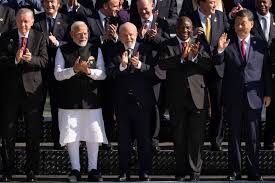Urgent Deadline (GS Paper 2, Hunger & Poverty)

Context
- The recent G-20 summit in Rio de Janeiro focused on addressing global hunger, poverty, and climate justice, but faced challenges due to competing global crises.
- Brazilian President Luiz Inácio Lula da Silva’s call to tax the wealthiest nations to combat poverty was met with limited success.
- The Global South continues to push for more effective action and governance at the global level, particularly in light of the urgent challenges posed by poverty and climate change.
Introduction
- The Rio de Janeiro G-20 summit aimed to tackle pressing issues such as global hunger, poverty, and climate justice.
- However, despite President Lula’s calls for greater fiscal responsibility from the wealthy nations, including a proposed 2% wealth tax on the richest individuals, the summit's focus was diluted by the ongoing global conflicts and geopolitical tensions.
Tackling Global Hunger and Poverty
- The central goals of the G-20 summit were to address global hunger and poverty, and to promote climate justice.
- President Lula highlighted poverty as “a scourge that shames humanity,” urging nations to adopt policies like taxing the world’s wealthiest to generate substantial revenue, which could be directed towards combating poverty.
- He proposed that a 2% wealth tax could raise over $200 billion for poverty alleviation.
- Despite these strong calls, the G-20 declaration fell short in terms of delivering concrete solutions or commitments to such ambitious proposals.
- The focus on poverty and hunger remained secondary to other geopolitical concerns.
Global South's Concerns
- Prime Minister Narendra Modi also emphasized the urgent need for the G-20 to represent the interests of the Global South, the majority of the world's population.
- He stressed that the voices of developing countries must guide global governance, which is crucial as the world grapples with inequality, poverty, and climate challenges.
G-20 Hosts and Focus
- This summit marked Brazil’s turn to host the G-20, following Indonesia in 2022 and India in 2023.
- As the third G-20 host from the Global South, Brazil’s leadership underscored the growing importance of emerging economies in shaping global discourse.
- The next G-20 summit is scheduled to take place in South Africa, continuing the trend of hosting by Global South nations, with an expected focus on solutions for poorer economies.
External Factors Impacting the Summit
- Several external factors diluted the summit’s focus.
- The timing of the G-20 summit coincided with escalating global conflicts, which overshadowed discussions on poverty and climate justice.
- This was the first G-20 meeting since the attacks on Israel on October 7 and the retaliatory strikes on Gaza and Lebanon.
- Additionally, the ongoing Russia-Ukraine conflict further complicated consensus-building, leading to a watered-down G-20 declaration.
- The declaration expressed only "deep concern" about the humanitarian crisis in Gaza but avoided taking concrete steps to address the conflicts or their broader implications.
Climate Justice and Financing
- The issue of climate justice and financing was a key concern for the Global South, with nations calling for more equitable contributions to address climate change.
- The G-20 summit was closely timed with COP29, hosted in Azerbaijan in 2025, where climate finance and justice were expected to be key topics.
- However, the U.S. presidential elections, held just before the summit, cast a shadow over these discussions.
- With former President Donald Trump’s previous climate stance of prioritizing fossil fuel exploitation, there were concerns that the U.S. would not invest the necessary resources into global climate action.
Conclusion: Future G-20 and Global South Leadership
- Looking ahead, the leadership of the Global South, particularly through the Indonesia-India-Brazil-South Africa (IIBSA) group, will be crucial in ensuring that future G-20 summits address the concerns of developing countries.
- The upcoming summit in South Africa must concretize solutions for poverty, hunger, and climate change, and create a path toward global governance reforms.
- With the U.S. set to host the G-20 again in 2026, the urgency of these issues will only grow, as the world faces an increasingly complex and interconnected set of crises.
- The Global South must continue to push for more effective global solutions, making the next G-20 summit a critical juncture in the fight against poverty and climate change.


